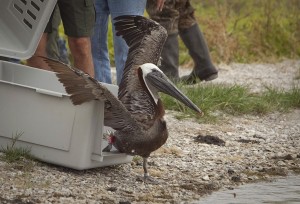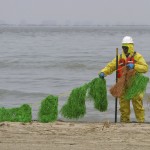Four Years After BP Spill, Settlement Money Slowly Trickles In

Bevil Knap/EPA/LANDOV
NWF hopes BP settlement money is used to rehabilitate species like this pelican based on scientific research.
In the aftermath of the 2010 BP oil spill, the worst in US history, the Gulf Coast is still adding up the costs of the disaster on coastal species and the ecosystem as a whole.
In the National Wildlife Federation’s updated annual report on the status of the Gulf Coast, the foundation lists several criminal and civil cases brought against BP and Transocean. Some have resulted in settlements of up to $2.5 billion and some are still pending.
Lacey McCormick, a representative for NWF, says the organization is concerned that money could be misspent as it slowly trickles in.
“Our concern with the RESTORE Act dollars in particular is that we need to make sure that this money is used to restore the Gulf of Mexico and is not spent on pet projects that will not help — and may even harm — the ecosystem of the Gulf of Mexico,” McCormick says.
For example, McCormick says, money should be funneled to restore the estuaries in areas such as Galveston and Matagorda Bay, which serve as “sort of the nursery for the Gulf of Mexico.” Those same areas are threatened by a recent oil spill in Galveston Bay.
Depending on the result of the civil trial, BP could end up paying as much as $14 billion to the Gulf Coast Restoration Trust Fund. The NWF report says this money will be allocated among the five Gulf states for comprehensive and state-specific restoration plans, research and long-term fisheries monitoring.
Update: In an emailed statement, BP says that “the National Wildlife Federation report is a piece of political advocacy – not science. It cherry picks reports to support the organization’s agenda, often ignoring caveats in those reports or mischaracterizing their findings.” BP maintains that the report is inaccurate and the NWF is an advocacy organization.
